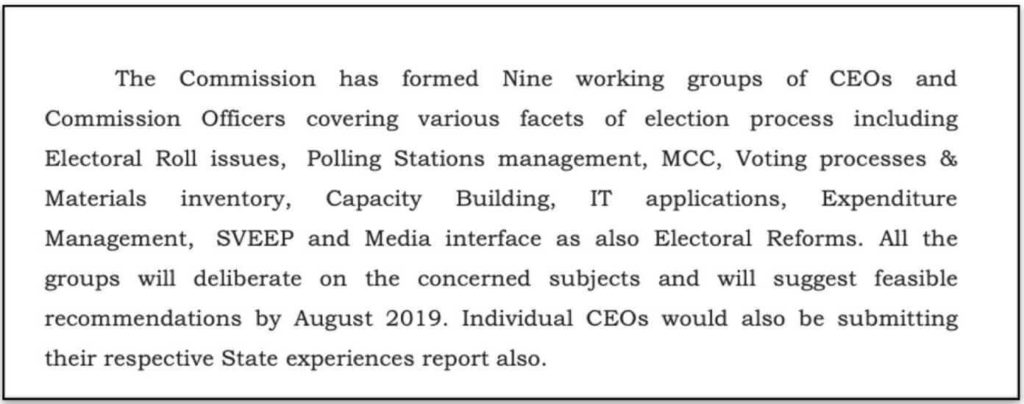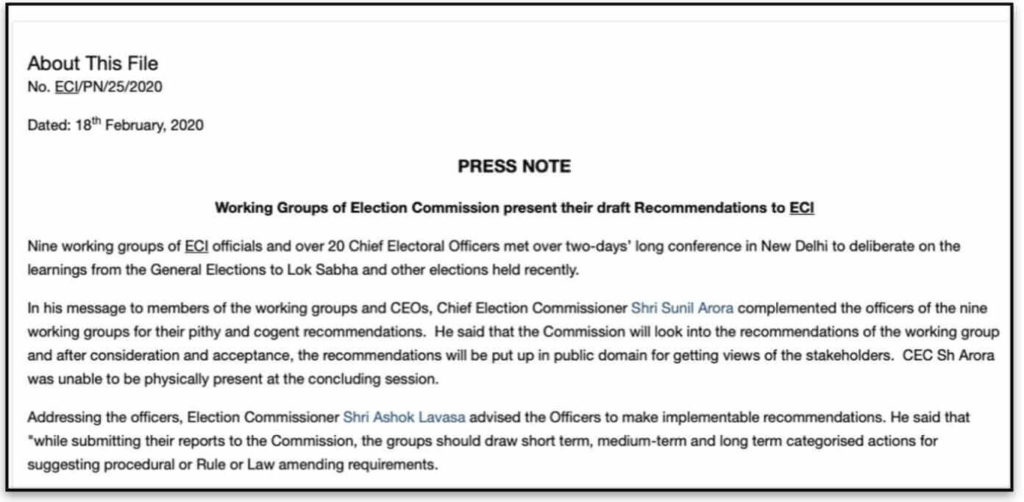The Election Commission of India constituted nine working groups after the 2019 Lok Sabha general elections to identify areas of improvement in the electoral process. The groups have made 25 major recommendations. The ECI has now sought public opinion on these recommendations. Here is a snapshot of these recommendations.
Since the conduct of the first Lok Sabha elections in 1951-52, there has been a continuous evolution of the election process in India. Regulations around curbing mal-practices, transparency in electoral funding, usage of technology for better & efficient conduct of elections including EVMs, SVEEP etc. are some of the many initiatives implemented by the Election Commission of India (ECI) over the years.
The 2019 General Elections are significant in terms of the scale as well as new measures implemented by the ECI. These include: C-Vigil app to report any malpractices, Voluntary Code of Ethics for Social Media, accessibility at every polling station etc.
Working Groups formed to review and provide recommendations
Post the General Elections, the ECI decided to consolidate all the measures taken and the learnings in the conduct of these elections, to help facilitate improvement in future. Accordingly, a conference was organized in New Delhi on 03 June 2019 with the Chief Electoral Officers (CEO) of all States/UTs.
For this purpose, nine working groups were formed, which constituted CEOs and EVI officials. These working groups had different focus areas which included aspects like – issues with Electoral Rolls, IT applications, SVEEP, Polling Station Management Electoral Reforms etc.

Each of the working groups is headed by a senior official from the ECI. The groups consisted of CEOs of various states. As per the initial mandate, they were required to come up with their recommendations by August 2019.
Multiple activities were undertaken to come up with recommendations. These include:
- Collating inputs from the field
- Analyzing the inputs in the context of existing legal and institutional frameworks
- Study of related provisions from Electoral Management bodies of other countries.
- Prepare the recommendations which could enhance the electoral process
On 18 February 2020, the nine working groups presented their draft recommendations to the ECI. This was presented in a two-day conference organized in New Delhi.

25 major recommendations presented for public review
The ECI has come with 25 major recommendations based on the recommendations by the working groups. These were placed in the public domain on 07 March 2020, with an invitation to citizens and stakeholders to come up with comments/suggestions.
The detailed recommendations placed in the public domain by the ECI are available here. Here is a snapshot of the recommendations.
Sl. No | Recommendation | Details |
1. | Single simplified form for all services to voters e.g. Registration, change of address, deletion of names etc. | The recommendation is to have a unified single form to be filled up by voters for various services, Instead of the multiple forms currently being used, like Form 1, Form 6, Form 6 (A), Form 7, Form 8, Form 8 (A) etc. This helps in avoiding confusion. |
2. | Expanding the network and Electoral Service Centres (ESCs)/ Voter Facilitation Centres (VFCs) to streamline Electoral Services to citizens. | Increase in the number of centres where electoral services can be delivered. The proximity of the centres would help in better services to the citizens. |
3. | Door-step electoral services to Persons with Disability (PwDs) and Senior citizens (80+ years). | Provision of Door Step services for PwDs & Senior Citizens in line with ECI’s ‘No Voter to be left behind’ Motto. |
4. | Online registration of prospective voters at age of 17 years – registration facilities to be provided in schools and colleges. | Provide online registration facilities in Schools/colleges for prospective voters at age of 17 years. |
5. | Preparing Electoral Roll of Graduates’ and Teachers’ Constituency through online platforms of ERO Net. | Online platform for creating electoral rolls of graduates and teachers constituency instead of the current offline method. |
6. | Revamping Booth Level Officer (BLO) System and appointing full time tech-savvy BLOs in a phased manner for services through handheld digital devices. | Develop dedicated BLOs with technical capabilities instead of relying on government functionaries at village/ward level who take up election duties beyond their regular duties. |
7. | Provision of e-EPIC for voters. | Providing a e-version of Voter Id Card. |
8. | Quarterly/six monthly qualifying date for voter registration instead of one annual date (1st January) as qualifying date. | The current provision has 1st January as the cut-off for calculating eligibility age. However individuals attaining 18 years later that year would lose out on voting in any election in the year. Suggestion is to have Quarterly or Half yearly cut-offs instead of Annual cut-offs. |
9. | Modern online Election Planning Portal for ECI, State/UT or district levels. | Developing online planning portal to coordinate the election planning at ground level. |
10. | Accessibility portal for providing speedy services to PwDs or Senior Citizens. | Dedicated Portal for Pwd and Senior Citizens. |
11. | GIS based Electoral Atlas for mapping of Parliamentary Constituencies, Assembly Constituencies or Polling Stations for public information. | Make information accessible to public regarding the territorial/geographical boundaries of constituencies along with information about polling stations. |
12. | Digital Election Calendar for information and schedule of Elections to public. | Creating digital platform for election calendar and election schedule will create more awareness to the public. |
13. | Institutional Strengthening for outreach and information dissemination. (recommendations 13- 18) |
|
14. | Outreach & Information Dissemination via New Outreach Media
|
|
15. | Orientation Programme for Media Persons, Political Parties, Civil Society Organizations (CSOs). | Facilitation of regular Orientation programmes for all the stake holder involved in election process. |
16. | New Voting Methods | Identify and implement new voting methods to increase voter participation, also ensuring that the process remains secure. |
17. | Print Media and Social Media regulation | Prohibit Print Media & Social Media akin to Electronic media during ‘period of silence’ under section 125 RP Act, 1951. Include Print & Social media within ambit of section 126 of RP Act, 1951. |
18. | Online nomination | Provision for online filing of nomination for Candidate in lieu of the current process where the candidate has to file the nomination in person before the returning officer. |
19. | Cap on Political Party Expenditure
| Levy a cap on expenditure of political parties for an election. ECI has earlier in 2015 has recommended Law Ministry to have a cap on the maximum expenditure of political parties. |
20. | Integration of Citizen-facing services
| To integrate voter registration process with services like Digi-Locker & Umang so that it is easy to upload necessary documents while registering. |
31 March 2020 is the last date to send comments/suggestions
As mentioned earlier, the intent of placing these recommendations in the public domain is to seek comments and suggestions from the citizens. It is a good opportunity for the citizens to be involved in the process of bringing improvements to the electoral process. A strong democracy requires a transparent and well-functioning electoral process. Right from registering the voters to conducting the elections, the improvement made at each of these levels would help in improving the overall process.
Comments/suggestions can be sent on email to coordination@eci.gov.in . The last date to send in the comments and suggestions is 31 March 2020.
Featured Image: Electoral Process improvements



1 Comment
Are you an individual businessman or a business organisation that wishes to expand in business? We offer financial instrument such as BGs, SBLCs,MTNs, LCs, CDs and others on lease and sales at a rate of 4%+2% of the face value and reasonable condition from a genuine provider. You are at liberty to engage our leased facilities into trade programs as well as in signatory project(s) such as Aviation, Agriculture, Petroleum, Telecommunication and any other project(s) etc.
With our financial/bank instrument you can establish line of credit with your bank and/or secure loan for your projects in which our bank instrument will serve collateral in your bank to fund your project.
We deliver with time and precision as set forth in the agreement. Our terms and Conditions are reasonable and we work directly with issuing bank lease providers, this instrument can be monetized on your behalf for up to 100% funding. Intermediaries/Consultants/Brokers are welcome to bring their clients and are 100% protected. In complete confidence, we will work together for the benefits of all parties involved.
BROKERS ARE WELCOME & 100% PROTECTED!!!
Intermediaries/Consultants/Brokers are welcome to bring their clients and cases to our attention and in complete confidence we will work together for the benefits of all parties involve.
For further details contact us with the below information Thank you.
Contact Person: Mr. Carson Noah
Email: centuryfinanceplc@gmail.com
Skype ID: centuryfinanceplc